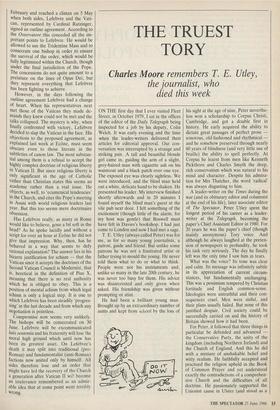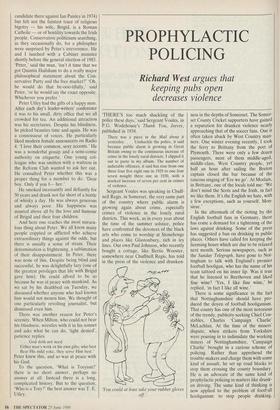THE TRUEST TORY
Charles Moore remembers T. E. Utley,
the journalist, who died this week
ON THE first day that I ever visited Fleet Street, in October 1979, I sat in the offices of the editor of the Daily Telegraph being inspected for a job by his deputy, Colin Welch. It was early evening and the time when the leader-writers delivered their articles for editorial approval. Our con- versation was interrupted by a strange and striking pair. A tall and beautiful blonde girl came in, guiding the arm of a slight, grey-haired man with cigarette ash on his waistcoat and a black patch over one eye. The exposed eye was clearly sightless. We were introduced, and the blind man held out a white, delicate hand to be shaken. He presented his leader. My interview finished shortly afterwards and in 20 minutes I found myself the blind man's guest at the vile pub next door. I felt something of the excitement (though little of the alarm, for my host was gentle) that Boswell must have felt in Davies's bookshop. I had just come to London and now I had met a sage.
T. E. Utley (always called Peter) was for me, as for so many young journalists, a patron, guide and friend. But unlike some patrons he was not a frustrated artist or father trying to mould the young. He never told them what to do or what to think. People were not his instruments and, unlike so many in the late 20th century, he was never too busy for them. His advice was disinterested and only given when asked. His friendship was given without prompting or stint.
He had been a brilliant young man. Brought up by an extraordinary number of aunts and kept from school by the loss of his sight at the age of nine, Peter neverthe- less won a scholarship to Corpus Christi, Cambridge, and got a double first in history. He early acquired the ability to dictate great passages of perfect prose sonorous, old-fashioned and rhythmical and he somehow preserved through nearly 60 years of blindness (and very little use of braille) the ability to spell perfectly. At Corpus he learnt from men like Kenneth Pickthorn and Charles Smyth the deep, rich conservatism which was natural to his mind and character. Despite his admira- tion for Mrs Thatcher, the word 'radical' was always disgusting to him.
A leader-writer on the Times during the war (and its obiturary editor and columnist at the end of his life), later associate editor of The Spectator, Peter Utley spent the longest period of his career as a leader- writer at the Telegraph, becoming the paper's Chief Assistant Editor in 1980. For 20 years he was the paper's chief (though mainly anonymous) Tory voice. And although he always laughed at the preten- sion of newspapers to profundity, he took his task very seriously. The day he finally left was the only time I saw him in tears.
What was the voice? Its tone was clear and calm. Its message was infinitely subtle in its appreciation of current circum- stances, but fundamentally unchanging. This was a pessimism tempered by Christian fortitude and English common-sense. Ideologies were untruthful and their con- sequences cruel. Men were sinful, and their plans usually failed. But none of this justified despair. Civil society could be successfully carried on and the history of Britain showed how it had been.
For Peter, it followed that three things in particular be defended and advanced the Conservative Party, the unity of the kingdom (including Northern Ireland) and the Church of England. And this he did with a mixture of unshakable belief and witty realism. He faithfully accepted and practised the religion upheld in the Book of Common Prayer and yet understood exactly the contradictions of a comprehen- sive Church and the difficulties of all doctrine. He passionately supported the Unionist cause in Ulster (and stood as a candidate there against Ian Paisley in 1974) but felt not the faintest trace of religious bigotry — his wife, Brigid, is a Roman Catholic — or of hostility towards the Irish people. Conservative politicians searching, as they occasionally do, for a philospher were surprised by Peter's irreverence. He and I lunched with a Cabinet minister shortly before the general election of 1983. `Peter,' said the man, 'isn't it time that we got Quintin Hailsham to do a really major philosophical statement about the Con- servative Party and the free market?"0h, he would do that be-000-tifully,' said Peter, 'or he would say the exact opposite. Whichever you prefer.'
Peter Utley had the gifts of a happy man. After each day's leader-writers' conference it was to his small, dirty office that we all crowded for tea. An additional attraction was his secretaries. Despite his blindness, he picked beauties time and again. He was a connoisseur of voices. He particularly liked modern female announcers on Radio 4: 'I love their common, sexy accents.' He was a wonderful gossip and a semi-comic authority on etiquette. One young col- league who was smitten with a waitress in the Reform Club wanted to ask her out. He consulted Peter whether this was a proper thing for a member to do. 'Dear boy. Only if you f— her.'
He smoked incessantly and defiantly for 50 years and drank not far short of a bottle of whisky a day. He was always generous and always poor. His happiness was assured above all by the love and humour of Brigid and their four children.
And here one reaches the most miracu- lous thing about Peter. We all know many people crippled or afflicted who achieve extraordinary things against the odds, but there is usually a sense of strain. Their determination is frightening, a sublimation of their disappointment. In Peter, there was none of this. Despite being blind and successful, he was delightfully lazy (one of the greatest privileges that life with Brigid gave him). He could afford to be so because he was at peace with mankind. As we sat by his deathbed on Tuesday, we discussed whether anyone who had known him would not mourn him. We thought of one particularly revolting journalist, but dismissed even him.
There was another reason for Peter's serenity. When Milton, who could not bear his blindness, wrestles with it in his sonnet and asks what he can do, 'light denied', patience replies
. . God doth not need
Either man's work or his own gifts; who best Bear His mild yoke, they serve Him best.' Peter knew this, and so was at peace with his God.
To the question, 'What is Toryism?' there is no short answer, perhaps no answer at all. Instead there is a long, complicated history. But to the question, 'Who is a Tory?' the best answer was T. E. Utley.











































































 Previous page
Previous page